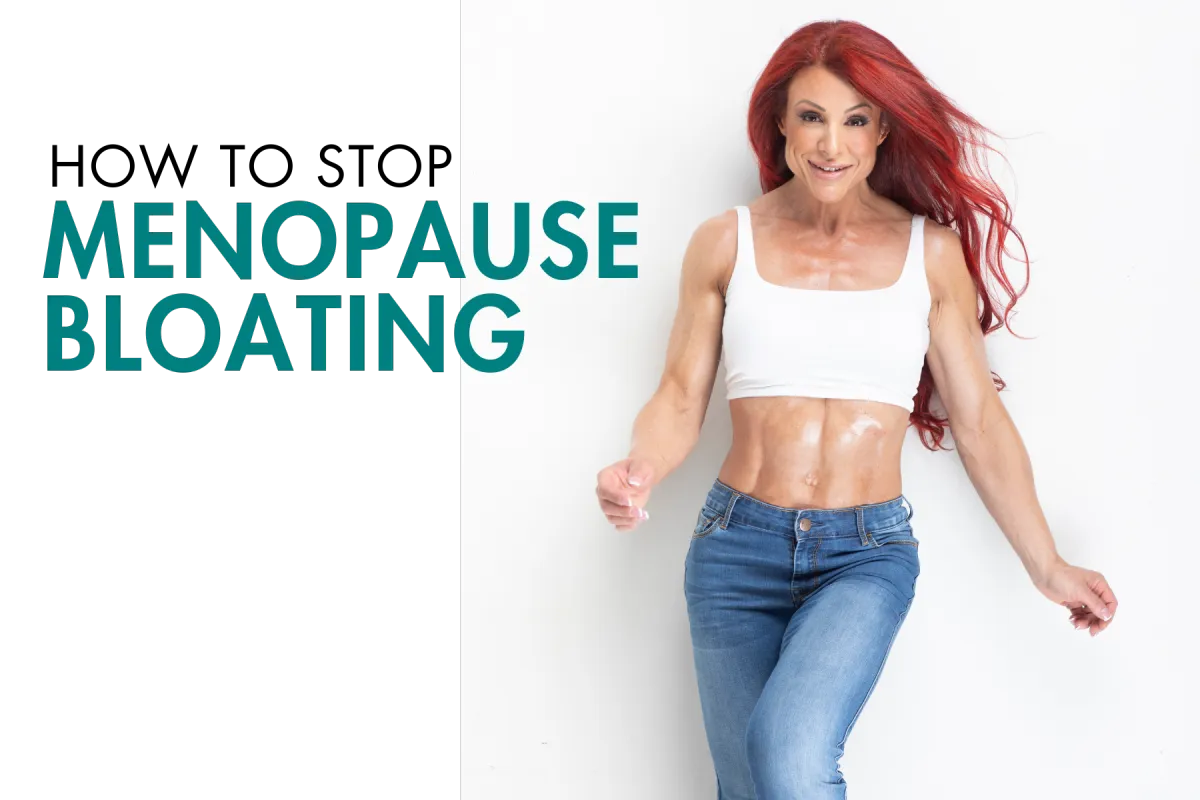
How to Stop Menopause Bloating
If you’re in your 40s or 50s and struggling with sudden bloating that doesn’t match your active and clean lifestyle…You’re not alone and you’re not broken!
What no one told us is that around 40, your body stops responding to the old rules. I thought it was just a myth until it actually happened to ME too.
You aren’t suddenly lazy or doing something wrong. After 40, the same strategies that used to get you lean (working out more and eating less) are now stressing out your body. 😱
Why You’re Bloated Even If You Eat Clean
During perimenopause and menopause, hormone changes sabotage even the most “perfect” routines.
Estrogen Fluctuations
When estrogen drops and progesterone tanks, your body retains more water and bloating gets worse—especially around your belly.
High Cortisol
You’re training harder to get your body back. But excessive cardio, stress, and undereating spike cortisol, which increases inflammation and belly fat.
Sluggish Digestion
Aging affects your gut microbiome and stomach acid. Foods you’ve tolerated for years suddenly leave you gassy, puffy, and bloated. (ie. Alcohol, dairy, even some fruits and veggies!)
Chronic Undereating
If you’ve been eating 1200–1500 calories for years, your metabolism is likely suppressed. This leads to poor digestion, muscle breakdown, and even more stubborn belly fat.
Is It Bloat or Belly Fat?
This is a question I get daily. Here’s how to tell:
📌 Bloat fluctuates throughout the day.
You might wake up flat but feel 5 months pregnant by night.
📌 Bloat feels tight or hard.
Fat is soft and steady—bloat creates distention and discomfort.
📌 Bloat responds quickly to food and stress changes.
Unlike body fat, it can shift significantly within 24–72 hours if you support your gut and hormones.
How to Stop Menopause Bloating
Ready to finally fix the bloat and flatten your belly again? Here's what you need to do:
✅ 1. Eat Enough (Yes, Really)
Undereating slows your digestion, increases stress hormones, and actually makes bloating worse. Your gut needs a rhythm, not restriction.
✅ 2. Limit Common Triggers (Even "Healthy" Ones)
Even clean eaters can feel bloated if they’re overdoing these:
Raw cruciferous veggies (kale, broccoli, cabbage)
Whey protein or artificial sweeteners
Instead, focus on cooked, warm, simple meals that give your digestion a break.
✅ 3. Support Your Gut
Menopause bloat is often a digestion issue, not a weight issue.
To improve gut motility:
Drink 80–100 oz water/day
Take a digestive enzyme or apple cider vinegar before meals
Add fermented foods (sauerkraut, kimchi, kefir) for probiotics
✅ 4. Train Smarter, Not Harder
Too much cardio or lifting without recovery = cortisol chaos.
That means more inflammation, slower digestion, and more bloat.
Instead:
Strength train 3–5x/week with active recovery days
Go for daily walks to reduce inflammation and move your gut
Use breathwork and magnesium to lower stress and sleep better
✅ 5. Track Your Triggers
Your bloating has patterns. But you won’t find them by guessing.
Start tracking:
Time of day bloating occurs
What you ate in the last 4–6 hours
Your stress levels, sleep, and hydration
If you were constipated or gassy
After a week, you’ll start to see exactly what your gut hates—and loves.
Want to Know Which 5 Foods to Avoid Right Now?
I created a free guide that breaks down the top 5 foods that secretly trigger menopause bloating—plus my go-to list of what to eat instead.
📲 Get the free guide inside my app here:
https://playbook.app.link/2a4cd592f52323d9e7002
